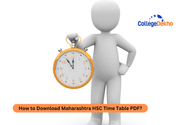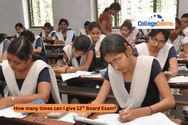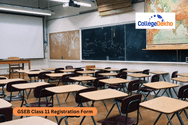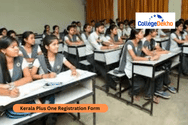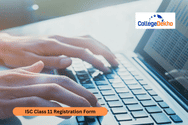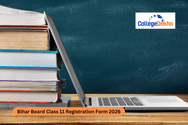- Karnataka Class 12 Arts Syllabus 2023-24 For Political Science
- Karnataka Class 12 Arts Syllabus 2023-24 For Sociology
- Karnataka Class 12 Arts Syllabus 2023-24 For Statistics
- Karnataka Class 12 Arts Syllabus 2023-24 For Psychology
- Karnataka Class 12 Arts Syllabus 2023-24 for Geology
- Karnataka Class 12 Arts Syllabus 2023-24 for Indian History
- Karnataka Class 12 Arts Syllabus 2023-24 for Geography
- Karnataka Class 12 Arts Syllabus 2023-24 for Logic
- Karnataka 12 Arts Preparation Tips
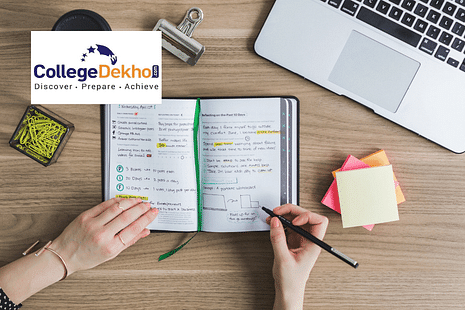

Never Miss an Exam Update
Karnataka Class 12 Arts Syllabus 2023-24
is released by the Department of Pre-University Education, Karnataka. The students can download the syllabus from the official website of the board in the PDF format. The board provides the syllabus for all subjects of Arts stream. The students preparing for the Karnataka board Class 12 Arts examination can check the subject-wise syllabus here. In addition to checking the
Karnataka Class 12 syllabus
, students can also go through the
Karnataka Class 12 Timetable 2024.
The class 12th board examination for Karnataka state will be conducted for March 1 to March 22, 2024. Students can prepare for the exams accordingly.
Going through the Karnataka Class 12 Arts Syllabus 2023-24, students can prepare all subjects. They can cover all the topics included in the subject as per the syllabus. In addition, they can also focus on the marks allotted to each of the chapters. This will help them to know the most important chapters and students can focus more on them. Students along with Karnataka Class 12 Arts syllabus may also check
Karnataka Class 12 Exam Pattern 2024
.
Karnataka Class 12 Arts Syllabus 2023-24 For Political Science
You can check out the details related to the Karnataka Class 12 Arts Syllabus 2023-24 for Political Science from the table given below and prepare yourself accordingly:
Chapters | Units |
|---|---|
Origin and growth of the Indian political system | 1.1 Government of India Act 1935 1.2 Indian independence Act 1947 1.3 Interim government 1.4 First general elections 1.5 Integration of Princely States 1.6 Re-organization of states 1.7 Geo-Political Map |
Elections and Party system in India | 2.1 Election – Meaning and Importance 2.2 Methods of Elections 2.3 Election Commission of India 2.4 Electoral Reforms 2.5 Party System in India 2.6 Functions of the Political Parties 2.7 Anti-Defection Law |
Administrative machinery in India | 3.1 Meaning and Role 3.2 Civil Service – Meaning and Features 3.3 All India Services, Central Services, State Services 3.4 Central, State & District Administration 3.5 CAT and KAT 3.6 UPSC& KPSC –Composition, Functions. |
Social movements and their political implications | 4.1 Dalit Movement 4.2 Backward Classes Movement 4.3 Peasant’s Movement 4.4 Labour Movement 4.5 Women’s Movement 4.6 Human Rights Movement 4.7 Environment Movement |
Nation-building and challenges to Indian democracy | 5.1 Nation Building- Components, Hindrances, and Responses 5.2 Challenges to Indian Democracy Inequality- Caste & Gender as a Slur Reservation & its justification as a Response 5.3 Illiteracy – as an impediment to Democracy Compulsory Education as response 5.4 Communalism – as a Commination to Democracy. Promotion of Secularism & National Integration as Remedy 5.5 Terrorism – as a threat to Democracy -Legislative Measures as justification. 5.6 Corruption – as a menace to Democracy The Prevention of Corruption Act as Remedy |
Emerging trends in Indian politics | 6.1 Coalition Government & Politics 6.2 New Dimensions of Centre-State Relations 6.3 Rise of Identity Politics 6.4 Youth Leadership In Indian Politics 6.5 Youth against Corruption 6.6 Youth against Terrorism |
Contemporary political trends | 7.1 Liberalisation – Meaning, & features 7.2 Privatisation – Meaning, Importance, Political Implications 7.3 Globalisation – Meaning, Importance, and Political Implications 7.4 Crony Capitalism 7.5 Rise of the Democratic Movement - Afghanistan, Nepal, Bhutan - Egypt, Libya, and Syria. |
International relations and politics | 8.1 Meaning, Definition & importance s 8.2 concepts of International relation 8.3 Development of international political system 8.4 Bi-polar, unipolar & multi-polar world 8.5 International organizations & regional organizations 8.5.1 Meaning, Definition & Development 8.5.2 India and the U.N 8.5.3 India and the ASEAN 8.5.4 India and the SAARC 8.5.5 India and the BRICS |
India's Foreign Policy | 9.1 Meaning and importance s 9.2 Basic principles of India’s foreign policy 9.3 India’s relation with - USA, Russia, - China, Pakistan, - Bangladesh & Sri Lanka |
Karnataka Class 12 Arts Syllabus 2023-24 For Sociology
You can check out the details related to the Karnataka Class 12 Arts Syllabus 2023-24 for Sociology from the table given below and prepare yourself accordingly. After Completing the syllabus students must also practice Karnataka Class 12 Sample papers 2024 .
Chapters | Units |
|---|---|
Making of Indian society | Demographic profile of India, Emergence of a pluralistic society, unity in diversity, national integration and challenges, measures to strengthen the national integration |
Social inequality exclusion and inclusion | Social inequality and exclusions. Changes in the caste system and concept of dominant caste OBC category and ST Gender inequality |
Inclusive strategies | Affirmative Action Related to SCs, STs & Women: Meaning of Affirmative Action and Protective Discrimination; Constitutional Safeguards for the Upliftment of Scheduled Castes and Scheduled Tribes, Legislative Measures for the Upliftment of Scheduled Castes, Developmental Measures for the Upliftment of Scheduled Castes, The Role of Gandhi and B. R. Ambedkar, The Role of Non-Governmental Organizations in the Upliftment of SCs and STs, Sulabh Shouchalaya Tribal Welfare Programmes; Economic Programmes, Educational Programmes, Research Programmes, Health, Housing and Other Schemes Women Empowerment |
Family in India | 4.1 Meaning, Definitions and Characteristics of Joint Family 4.2 Types of Joint Family: Patriarchal: Illom, Matriarchal: Tarwad– Oxrilocal residence of Nagamoola Bunts – The Okka – Coorgies – Patriarchal Joint Family, Narasinganavar Family 4.3 Advantages and Disadvantages of Joint Family- Structural and Functional Changes - Causes for Changes 4.4 View of Sociologists on Joint Family - Recent Trends in Indian Family |
Change and Development of Villages | Meaning and Characteristics of Village Community, Characteristics of Village Community, Indian Villages through the Ages 5.A.2 Villages Studies and Its Importance 5.A.3 Problems of Indian Villages – Social, Economic and Agricultural Problems - Farmers Suicide in Karnataka, Causes of Agrarian Crisis, Understanding Farmer’s Suicide, The Committees to study the Agrarian Issues in Karnataka, Recent Policy Initiatives 5.A.4 Rural Developmental Programmes; Meaning of Rural Development, Land Reforms, The Green Revolution, Panchayathi Raj, Community Development Programme (CDP), Integrated Rural Development Programme (IRDP) and MGNAREGA. 5.A.5 Changes in Indian Villages: Continuous Migration of People towards the Cities, Farm to Non-farm and Special Economic Zone (SEZ). B. Urbanization in India 5.B.1 Meaning and Definitions of Cities and Urbanization, Historical Background of Urbanization in India 5.B.2 Problems of Indian Cities- Urban poverty, Slums, Solutions to Urban Problems. |
Economic, Political and Communication Systems | 6.1 The Market as a Social Institution: 6.1.1 Meaning of Market 6.1.2 Features of Market 6.1.3 Sociological Perspectives on Market and the Economy – 6.1.4 Weekly Market as a Social Institution – 6.1.5 Bastar Tribal Market – Chhattisgarh, 6.1.6 Traditional Business Communities 6.1.7 Caste Based Trade among the Nakarattars of Tamil Nadu 6.1.8 Social Organisation of Markets – ‘Traditional Business Communities’ 6.1.9 Pushkar Annual Fair 6.1.10 Virtual Markets 6.1.11 Emergence of Virtual Markets 6.1.12 Online Shopping Sites in India 6.1.13 Interlinking of Markets and Mcdonaldization 6.2 Political Institutions and Processes: 6.2.1 Meaning of Political Institution 6.2.2 Political Processes 6.2.3 The Nature of Indian Democracy; Meaning and Types of Democracy 6.2.4 The Core Values of Indian Democracy 6.2.5 Competing Interests: The Constitution and Social Change 6.2.6 Political Parties, Pressure Groups and Democratic Politics 6.2.7 Constitutional Norms and Social Justice: Interpretation to Aid Social Justice 6.2.8 Local – Level and Grassroots Political Studies 6.2.9 Studies of State-Level Political Behaviour 6.3 Mass Media: 6.3.1 Meaning of Mass Media 6.3.2 Functions of Mass Media 6.3.3 Types of Mass Media; Print Media and Electronic Media 6.3.4 Globalization and Mass Media 6.3.5 Understanding Media in the Contemporary World |
Social Movements | 7.1 Social Movements in India 7.2 Farmers’ Movement 7.3 Backward Class and Dalit Movement 7.4 Women’s Movement in India |
Social Change in India | 8.1 Social Change in India; Introduction to Social Change in India 8.2 Sanskritization; Meaning and Definition of Sanskritization, Major Factors of Sanskritization, Criticisms of Sanskritization, Brahminization and Sanskritization 8.3 Westernisation; Meaning and Definition of Westernization, The Impact of Westernization, Criticisms of Westernization 8.4 Modernisation; Meaning and Definition of Modernization; Causes Modernization, Process of Modernization in India 8.5 Globalization; Meaning and Definition of Globalization; Factors Contributing to Globalization; Two Major Dimensions of Global Outlook; Homogenization and Hybridization of culture; Barbie Doll – Truly a Global Citizen |
Karnataka Class 12 Arts Syllabus 2023-24 For Statistics
You can check out the details related to the Karnataka Class 12 Arts Syllabus 2023-24 for Statistics from the pointers given below and prepare yourself accordingly. Students may also Karnataka PUC Syllabus 2024 .
- Vital statistics
- Index number
- Time series analysis
- Interpolation and extrapolation
- Theoretical distribution
- Statistical inference
- Statistical Quality Control
- Operations Research
Karnataka Class 12 Arts Syllabus 2023-24 For Psychology
You can check out the details related to the Karnataka Class 12 Arts Syllabus 2023-24 for psychology from the table given below and prepare yourself accordingly:
Chapters | Units |
|---|---|
Intelligence | Introduction Meaning and definition- Binet & Simon, Wechsler, Munn. Theories of intelligence – Spearman, Triarchic (Sternberg’s) Thurstone Growth of intelligence- Terman and Merrill Studies Factors influencing intelligence- socio-cultural and biological factors History of intelligence testing. Calculation of Intelligence- MA, CA, IQ concepts, problems for calculating IQ Distribution of intelligence- NPC and table Special abilities –Intellectually giftedness, aptitude, and creativity. Mental retardation- Definition, APA classification. Tests of Intelligence- Verbal, nonverbal &Performance tests Some of the tests developed in India Uses of intelligence tests Emotional Intelligence (EI) Artificial intelligence- Pros and cons Activities Points to Remember Questions |
Personality | Introduction Meaning and definition- Allport Approaches personality Type- Indian Ancient (Trigunas), Jung, Friedman and Rosenman (A, B, C&D) Trait- Cattle’s Surface and Source trait, Allport’s- cardinal, central and secondary traits. Psychodynamic Approach- Freud Erick Erickson – Psycho-social theory Assessment of personality Self-reporting measures- EPI, MMPI, 16PF Projective tests-TAT, Rorschach, SCT Behavioral analysis- rating scales, interview Activities Points to remember Questions. |
Challenges of Adjustment | Introduction Nature and meaning of stress Types and sources of stress – General Model of Stress Process. Effects of stress- Emotional, physiological cognitive, and behavioral. Burnout General Adaptation Syndrome (GAS) Stress and Immune system Coping mechanism- 1. Task-oriented strategy 2. Emotion-oriented strategy. 3. Avoidance-oriented Strategy. Stress management techniques Exercise and relaxation, yoga – asana, pranayama, dhyana. Time management Developing healthy habits – diet, lifestyle, life skills, and self-care. Developing a positive attitude and positive thinking. Activities Point to remember Questions |
Psychological Disorders (ABNORMALITY) | Introduction Concepts (deviance, dysfunction, distress, danger) Historical background Classification – DSM, ICD Factors influencing abnormal behavior – biological, psychological, socio-cultural. Major mental disorders – Anxiety, phobia, OCD, PTSD. Somatoform disorders- Pain, conversion, hypochondriasis, dissociative disorders- fugue and amnesia Mood disorders – depression, mania, bipolar Schizophrenia- meaning, symptoms (positive & negative), types Psychopathy, ADHD, ODD, conduct disorders, autism, eating disorders Substance abuse- drug addiction, alcohol, sedatives (narcotics), stimulants, tranquilizers Effects of alcohol Activities Points to remember Questions |
Therapeutic Approaches | Introduction Nature and process Therapeutic relationship Type of therapies Psycho analysis Behavioral therapy Cognitive therapy Humanistic (Roger’s) Existential therapy – (logotherapy) Biomedical Therapy – ECT, psychosurgery Yoga therapy Rehabilitation of mentally ill Activities. Points to remember Questions |
Psychology-its Social Relevance | Introduction Explaining social behavior Part A – 10 hrs Attitude Nature and components of attitude Attitude formation and change Prejudice- Meaning and definition Growth of prejudice Expression of prejudice 1. Stereotypes 2. Social distance Strategies to handle prejudice Pro-social behavior - altruism and empathy Activities Points to remember Questions Part B - 8 hrs Group processes Nature and meaning, formation of the group, why people join the group. Types of group Social facilitation Social loafing Conformity Obedience Co-operation and Competition Dissent Activities Points to remember Questions |
Psychology And Life | Introduction Human- Environment Relationship Environmental Effects on human behavior Human Influence on Environment Human Promoting Pro-environmental Behaviour Psychology and Social concern Impact of Electronic Media Activities Points to Remember Questions |
Nurturing Psychological Skills | Introduction Evolving as a psychologist: i) General Skills ii) Observational Skills Counseling - Stages; skills a) Communication Skills b) Psychological testing skills c) Interviewing skills Empathy, positive regard, authenticity. Areas of counseling College counseling Educational counseling Vocational counseling Approaches to counseling: Directive, Client-centered, Eclectic, group. Activities Points to remember Questions |
Karnataka Class 12 Arts Syllabus 2023-24 for Geology
The details related to the Karnataka Class 12 Arts Syllabus 2023-24 fr Geology are given in the list provided below:
- Petrology
- Structural Geology
- Stratigraphy
- Paleontology
Karnataka Class 12 Arts Syllabus 2023-24 for Indian History
The details related to the Karnataka Class 12 Arts Syllabus 2023-24 for history are given in the list provided below:
- Introduction
- Stone age and metal age
- Indus civilization
- Ancient period
- Medieval period
- Socio-Religious Reform Movement in medieval India
- Modern period
Karnataka Class 12 Arts Syllabus 2023-24 for Geography
The details related to the Karnataka Class 12 Arts Syllabus 2023-24 for Geography are given in the list provided below:
- Human Geography
- World Population
- Human Economic Activities
- Transport And Communication
- Human Settlements
- Population of India
- Land and Water Resources
- Agriculture
- Mineral and Power Resources
- Manufacturing Industries
- Transport, Communication and Trade
- Geographical Perspectives On Environmental Issues – Planning And Sustainable Development
Karnataka Class 12 Arts Syllabus 2023-24 for Logic
You can check out the details related to the Karnataka Class 12 Arts Syllabus 2023-24 for Logic from the table given below and prepare yourself accordingly:
Chapters | Units |
|---|---|
NATURE OF INDUCTION | A.Differences between deduction and induction. Relation between deduction and induction. B. Kinds of Induction. I. Improper induction:- a. Perfect induction b. Parity of reasoning c.Colligation of facts II. Proper Induction:- a. Simple Enumeration–Characteristics, Merits and:- demerits, the fallacy of Hasty Generalization b. Analogy – characteristics of good Analogy, uses of Analogy, the fallacy of unsound analogy. c.Scientific Induction- characteristics |
POSTULATES OF INDUCTION / GROUNDS OF INDUCTION | Formal Grounds of Induction I. Law of uniformity of nature. Kinds of uniformities a. The uniformity of succession b.Uniformity of co-existence c. Uniformity of Equality and Inequality. Origin or Ground of our belief in the uniformity of nature 1. Intuitional theory or a priori theory 2. A posterior theory or empirical theory, fallacy of petitio principii 3. The evolutional theory II. Law of causation. Material grounds of induction 1. Observation: Characteristics, conditions of observation – fallacies – nonobservation, malobservation, the importance of scientific instruments in observation 2. Experiment: Characteristics – differences between observation and experiment. Advantages of observation over experiment - Advantages of experiment over observation |
CONCEPT OF CAUSE | Popular view of causation – a plurality of causes, the conjunction of causes, intermixture of effects – Homogeneous, Heterogeneous. Aristotle’s view of cause – material cause, formal cause, efficient cause, final cause J.S. Mill’s view of the cause. Characteristics of causation Scientific view of causation – quantitative view of causation - Differences between popular and scientific view of causation, cause, and condition. The fallacy of Post – hoc – ergo–propter – hoc. |
J.S.MILL’S EXPERIMENTAL METHODS | Introduction - Five experimental methods of J.S.Mill 1. Method of Agreement 2. Method of Difference 3. Joint method of agreement and difference 4. Method of concomitant variation5. Method of residues Evaluation of Mills methods. |
SCIENTIFIC METHOD AND HYPOTHESIS | Scientific method – Nature and characteristics of science, Scientific method – Scientific attitude. Hypothesis – meaning and formation of Hypothesis – characteristics of good hypothesis – verification of hypothesis – proof of hypothesis – crucial instance – crucial experiment – the role of hypothesis in a scientific investigation. |
PROBABILITY | Probability – meaning – grounds of Probability – Probability and induction. |
SCIENTIFIC EXPLANATION | Meaning – kinds of Scientific Explanation – differences between popular and Scientific Explanation – limits of Scientific Explanation. |
MATERIAL FALLACIES | Meaning, nature, kinds 1. The fallacy of argumentum – ad – Hominum 2. The fallacy of argumentum – ad –Baculum 3. The fallacy of argumentum – ad – Vericundium 4. The fallacy of many questions |
INDIAN LOGIC | Theories of errors – a. Atmakhyathi vada, Asathkhyathi Vada, Anyathakhyathi Vada, Anirvachaneeyakhyathi Vada b. Theories of Causation 1. Sankhya Darshana 2. Vaisesika Darshana 3. Adwaitha 4. Vishistadwaitha 5. Bouddha Darshana 6. Charvaka Darshana |
Karnataka 12 Arts Preparation Tips
When going for the Karnataka 12 Arts exam, students should have good knowledge of the exam pattern, marking system, types of questions, exam duration and all such details. In addition to this, students should follow the essential Karnataka 2nd PUC preparation tips to perform their best in the board exams:
- Students can write answers in any of the languages such as Kannada, Tamil, Malayalam, Marathi, Telugu, English, Sanskrit, and Urdu. Hence, students should be good at any one of the languages.
- They should complete the syllabus in advance and keep time for revision.
- Prepare handwritten notes to understand the topics and quickly revise a day before the exam.
- Solve previous year question papers to check the level of preparation.
It is important for the students to download the official Karnataka Class 12 Arts Syllabus 2023-24 given above. You can check out the details related to the subject-wise syllabus from the article mentioned above. Students after completing the syllabus should also cover Karnataka Class 12 Previous Year Question papers .
Are you feeling lost and unsure about what career path to take after completing 12th standard?
Say goodbye to confusion and hello to a bright future!

Was this article helpful?










